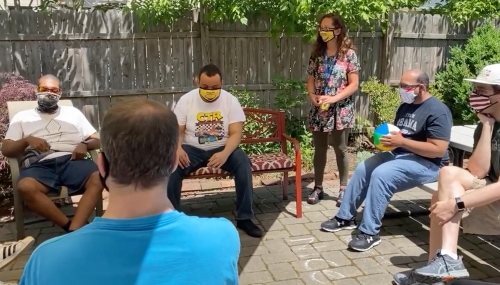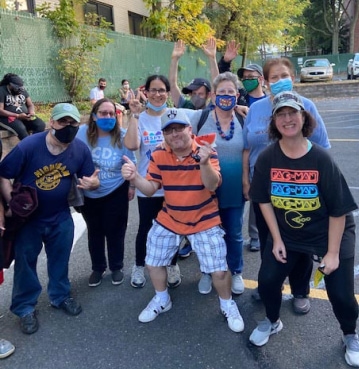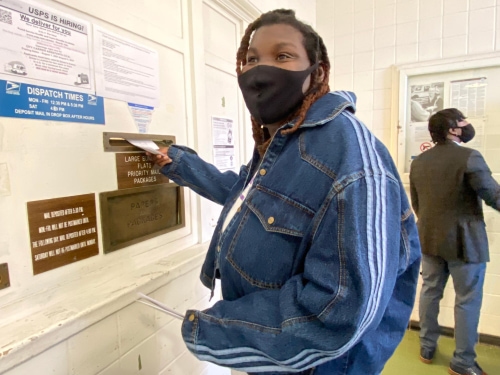Frequently Asked
Questions
Who does JESPY House serve?
JESPY House serves adults, ages 18 and up, with Intellectual and Developmental Disabilities. We provide services and programs to help our clients achieve their full potential and to lead independent lives in an inclusive community using choice and self-direction. JESPY clients can live in one of our residential properties or they can live on their own and still participate in all of our other programs and services.
We provide an environment where people with disabilities live and work together regardless of race, color, religion, creed, sexual orientation, gender identity, national origin, or ancestry.? Along with our clients and their families, we work to break down barriers (attitudinal, communication and physical) to ensure that our clients have opportunities for full community inclusion.
Is JESPY House the right fit for my family member?
The first step in determining if JESPY House is appropriate for your family member is a conversation with our Intake Coordinator. During this conversation , you will learn about the programs and services as well as the level of care we offer at JESPY House. If placement is appropriate, an admissions packet is sent out to the family and/or guardian for review. If the family and/or guardian wishes to proceed with the application process, an appointment will be scheduled for an initial interview with the prospective client, conducted by the Intake Coordinator and the Residential Supervisor.
To schedule your initial conversation with our Intake Coordinator, please call (973) 762-6909, Ext. 302 or email jcalabrese@jespy.org.
How do clients pay for JESPY services?
JESPY services are paid for through a variety of funding streams. Clients who are registered with the New Jersey Division of Developmental Disabilities (DDD) may receive funding to pay for services under the Supports Program Waiver or Community Care Waiver. As both of these waivers are funded through Medicaid, the client must be Medicaid-eligible in order for JESPY to receive payment through DDD. JESPY staff are well versed in the DDD process and are more than willing to help you navigate these programs.
Work Readiness and Employment Engagement Services may be funded through the New Jersey Division for Vocational Rehabilitation.
All JESPY services may also be paid by the guardian and/or client if the client is not eligible to receive funding from DDD. Client may use their social security benefits for payment. Those clients who are employed may use part of their wages to pay for services.
When does a client advance from JESPY residential housing to the Outclient Program?
Clients move from JESPY-sponsored residential housing to the Outclient Program when they consistently demonstrate the skills necessary for independent living with minimal support services. Key factors considered are the ability to:
exercise sound judgment and behavior in the community,
be compliant with program requests,
master basic daily living skills, and
utilize some money management skills.
A team of case managers, residential staff, other program supervisors and staff collaborate in deciding if the client will be safe in the community. If so, a family meeting is scheduled to discuss the opportunity.
When is the right time for my family member to start at JESPY?
The right time is the one that works best for you and your family member. JESPY clients are admitted on a rolling basis throughout the year and may begin participating in programs and services as soon as they are successfully admitted.
The best time to start the JESPY journey is before your 18-year-old is no longer eligible for school programs. When school-related services are nearing a close, JESPY can provide supplementary activities that promote growth and development. There is flexibility in engaging JESPY services since participants are not required to start them all at once. For example, new clients can choose to start in JESPY’s Day or Recreation Programs where they can make new friends while learning more about the JESPY community. Later, they can move on to the Work Readiness and Employment Engagement Services and/or supportive housing.
Gradual integration will ease the transition from school programs for people with intellectual and developmental disabilities to JESPY’s programs that foster an adult’s ability to live independently and gain competitive employment.
JESPY House also welcomes new clients who are well beyond the transitional years once school-related services end.
Which Housing option is best for my family member?
Click HERE to see which Residential option may be best for your family member.
Where can I find out what programs are being offered this month?
Every week our program supervisors for EEP (Engagement & Enrichment) and Day Habilitation release a calendar full of programs for the coming 7 days. Programs are offered throughout the day starting as early as 9am with the last program beginning as late as 8pm. We strive to offer a flexible schedule so that all clients have the ability to participate in programs, forge new relationships, and grow as individuals.
My family member is a current JESPY client and is requiring more services. What should I do?
If your family member needs to make changes to their current services, contact your case manager. Together we can review your family member’s changing needs and develop a plan and implement any necessary changes.
I want to support JESPY House. How can I get involved?
JESPY is as strong as its community of supporters, and we always need more support to provide the best possible services for our growing client population.
As a registered 501(c)(3) non-profit organization, you can make a tax-deductible donation, set up a reoccurring monthly gift, include JESPY House in your will, donate appreciated securities, and more. Contact Amy Engel at (973) 437-3770 to discuss which gift option is best suited for you.
Looking to get more involved than donating support? Consider applying to join our Board of Trustees which advises and guides JESPY House. Complete the application linked here.
Where can I find helpful resources regarding adults with intellectual and developmental disabilities?
ABLE NATIONAL RESOURCE CENTER
http://www.ablenrc.org/what-is-able/what-are-able-acounts/
Learn about ABLE accounts, tax-advantaged savings accounts for individuals with disabilities and their families Now, eligible individuals
and their families will be allowed to establish ABLE savings accounts that will not affect their eligibility for SSI, Medicaid and other public benefits.
NEW JERSEY DEPARTMENT OF HUMAN SERVICES, DIVISION OF DEVELOPMENTAL DISABILITIES (DDD)
http://www.nj.gov/humanservices/ddd/home/
This state agency provides public funding for services and supports that assist New Jersey adults with intellectual and developmental disabilities age
21 and older to live as independently as possible.
NEW JERSEY DDD SUPPORTS PROGRAM POLICIES AND PROCEDURES MANUAL – A QUICK GUIDE FOR FAMILIES
http://www.nj.gov/humanservices/ddd/documents/family_guide_to_supports_program_policy_manual.pdf
This 2017 guide summarizes the information in DDD’s Supports Program Policies and Procedures Manual – the rules that govern Supports
Program eligibility and process – in a comprehensive, yet uncomplicated format.
STUDENTS AGING OUT OF SCHOOL SYSTEM – INFORMATION FROM NJ DDD
http://www.nj.gov/humanservices/ddd/documents/2018-graduates-aging-out-of-school-system.pdf
Learn what steps must be followed to access services/supports from the NJ DDD when students have exhausted their educational entitlement by turning 21
years of age.
NEW JERSEY DIVISION OF VOCATIONAL REHABILITATION SERVICES (DVRS)
http://careerconnections.nj.gov/careerconnections/plan/foryou/disable/vocational_rehabilitation_services.shtml
Any individual with a physical, mental, cognitive, or other form of disability that has a substantial impediment to employment may qualify for
services through this state agency.
NEW JERSEY ASSOCIATION OF COMMUNITY PROVIDERS (NJACP)
http://njacp.org/
This organization is dedicated to advancing sustainable community-based services and supports that enrich lives and build futures for people with
intellectual, developmental and other disabilities across the state.
SUPPORTIVE HOUSING ASSOCIATION OF NEW JERSEY
http://www.shanj.org/
A statewide nonprofit organization that works towards the establishment of a strong supportive housing industry in New Jersey, serving persons with
disabilities.
NATIONAL PARK SERVICE – FREE PASSES
http://store.usgs.gov/pass/access.html
This agency offers free lifetime passes to National Parks for people with permanent disabilities who are citizens or permanent residents of the United
States.



